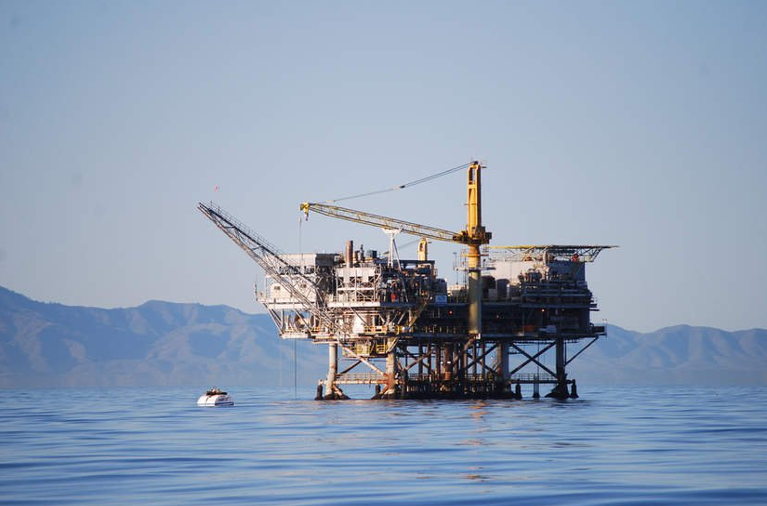“We knew it was going to cause a stir,” said Australian marine scientist Dr. Robert McCauley.
McCauley was referring to the results of an experiment testing the impacts of a common oil and gas industry technique in waters off southern Australia, which were reported in a scientific paper in June 2017.
The world’s powerful offshore oil and gas industry has used seismic surveys for decades as the primary way to locate fossil fuels under the ocean floor.
Impacts of Seismic Surveys
Seismic surveys involve an underwater air gun pulled behind a boat and fired at intervals, and as the shock waves bounce off the sea floor and return to sensors, they help reveal where oil and gas might be.
McCauley, an associate professor at Curtin University in Western Australia, and his colleagues wanted to know what these seismic surveys did to zooplankton — an organism at the base of the marine food web.
According to their results, published in the Nature journal Ecology and Evolution, there was a two to three-fold increase in the number of dead zooplankton at a distance of at least 1.2 kilomenters (about three-quarters of a mile) from the air gun after the blasts. That is much farther than previous reports of impacts out to only 10 meters or so (roughly 33 feet).
But as reported in Guardian Australia, two major U.S. oil and gas industry groups have been writing to regulators describing McCauley’s findings as “seriously flawed” while commissioning other unnamed experts who have also criticized the study.
McCauley, who has been researching the impacts of seismic surveys on marine life since the early 1990s, told Guardian Australia the criticisms of his research were a “whitewash.”
He told me: “You have to expect that some people will do their best to discredit [the study] so they can carry on as before. They will throw as much mud and confusion around to stall the process.”
Jayson Semmens, Associate Professor with the Institute for Marine and Antarctic Studies at the University of Tasmania and a co-author of the zooplankton study, defended the findings. He said while there was “no perfect experiment,” he was confident in the results.
Using sonar images, the study looked at the abundance of zooplankton after the air gun blasts and analyzed the organisms caught in nets, which revealed the increase in dead zooplankton.
An industry standard airgun being fired in Storm Bay, south of Hobart, Tasmania. McCauley and Semmens’ research examined the impact on the tiny marine life below. Credit: Rob McCauley
Semmens says there are many studies on the impacts of seismic surveys on fish and marine mammals, but there was almost no knowledge of how the exploration technique affected invertebrates.
Semmens and McCauley have begun to try and fill this knowledge gap, co-authoring research with colleagues finding the seismic surveys negatively impacted the immune systems of lobsters and were linked to deaths in scallops.
Scientific Results Raising Tensions
The research is already raising tensions among the oil and gas industry, regulators, and the fishing industry.
In North Carolina, state authorities have cited the studies, and others, in letters to companies looking to continue seismic surveys off the coast.
Braxton Davis, director of the N.C. Divisions of Coastal Management and Marine Fisheries, said in December 2017: “Based on the new studies, we believe the proposed seismic testing could severely impact North Carolina’s commercial and recreational fisheries, and we are requesting more information for review by state officials and the public.”
Commercial fishers in Australia’s state of Victoria and Tasmania are also concerned that planned seismic surveys could impact their lobster, abalone, scallop, and crab industries.
In a response to the concerns in North Carolina, the American Petroleum Institute (API) and the International Association of Geophysical Contractors (IAGC) wrote to the U.S. National Marine Fisheries Service and the Bureau of Ocean Energy Management, saying the zooplankton results were “of questionable scientific merit.”
The letter, signed by IAGC president and API policy advisor Andy Radford, claimed that McCauley and Semmens had “concurred with many of the shortcomings” which the industry groups’ unnamed reviewers had identified with the zooplankton study.
But McCauley and Semmens have strongly rejected this version of events, saying they had only agreed their work needed replicating by other researchers — a point made in the original research paper.
Gail Adams-Jackson, a spokesperson for IAGC, said they “stand by our statement.”
She said: “The IAGC sought seven independent reviews, and several of them indicated that while the research findings were thought-provoking, they were certainly not convincing. The consensus was that more research is needed in this area.”
She would not name the reviewers commissioned by IAGC and API, citing confidentiality, and said they had not been paid “for their initial reviews.”
She added: “While we found the study interesting and worthy of additional research, we remain troubled by its small sample sizes, the large day-to-day variability in both the baseline and experimental data, and the large number of speculative conclusions that appear to be inconsistent with the data collected over a two-day period.”
“As a result, both statistically and methodologically, we stand by our initial assertion that this project falls short of what would be needed to provide a convincing case for adverse effects from geophysical survey operations.”
Main image: Oil rig in California’s Santa Barbara Channel. Credit: dirtsailor2003, CC BY–ND 2.0





